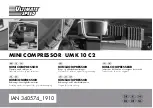
5
RESULTING IN SERIOUS INJURY TO YOU OR
OTHERS.
• Failure to properly drain condensed water from the
tank, causing rust and thinning of the tank wall.
• Modifications or attempted repairs to the tank.
• Unauthorized modifications to the pressure censor,
relief valve, or any other components, which control
tank pressure.
• Move or transport the compressor with the air tank is
filled up.
HOW TO PREVENT IT
• Drain air tank daily or after each use. If air tank
develops a leak, have it repaired by authorized service
facility.
• Do not drill into, weld or otherwise modify air tank or it
will weaken. The tank can rupture or explode, replace
with a new air tank by authorized service facility.
• Follow the equipment manufactures recommendation
and never exceed the maximum allowable pressure
rating of attachments. Never use the compressor to
inflate small low-pressure objects such as children’s
toys, footballs, basketballs, etc.
• In order to avoid bursting the air tank by dropped or
struck it, do not move and transport with the air tank is
filled up.
WARNING:
Risk of Attachments and Accessories
Bursting
WHAT CAN HAPPEN
Exceeding the pressure rating of air tools, spray guns, air
operating accessories, tyres AND other inflatables can
cause them to explode or fly apart, and could result in
serious injury to you and others.
WARNING:
Risk of Electric Shock
WHAT CAN HAPPEN
• Your air compressor is powered by electricity. Like any
other electricity device, if it is not used property, it may
cause electric shock.
• Electrical grounding (PE): failure to provide adequate
grounding to this product could increase the risk of
electric shock.
• This compressor is for indoor use. Do not install the
compressor in any place exposed to rain or splashed
water, high-humidity place or high-temperature place.
Never operate the compressor in damp or wet
locations. If use in the wet condition, it could produce
an electric shock or be short-circuited, resulting in
ignition.
• Do not connect to the power supply with the cover of
the compressor put off. Contact with electrical circuit, it
may cause electric shock. Doing so can result in
serious injury to you.
• Contact with electrical circuit inside the compressor
when it is in shuts off within 10 seconds, could cause
electric shock. Doing so can result in serious injury to
you.
HOW TO PREVENT IT
• Any electrical wiring or repairs required to this product
should be performed by qualified service personnel or
qualified electrician, in accordance with national and
local electrical codes.
• Make certain that the electrical circuit to which the
compressor is connected provides proper electrical
grounding, correct voltage, and adequate fuse
protection.
• Never operate the compressor outdoors when it is
raining, or in a wet environment.
• Never operate the compressor with guards or covers
which are damaged or removed.
• Never put off the cover of the compressor except
MAKITA authorized dealer.
• Never contact with electrical circuit when the
compressor is in shuts off within 10 seconds.
WARNING:
Risk of Explosion or Fire
WHAT CAN HAPPEN
• It is normal for electrical contacts within the motor and
motor driver, switch to spark, whenever the
compressor starts or stops. Never operate the
compressor in an atmosphere where flammable or
explosive vapours are present. Doing so can result in
serious injury to you or others.
• This compressor is for indoor use. Do not install the
compressor in any place exposed to rain or splashed
water, high-humidity place or high-temperature place.
Never operate the compressor in damp or wet
locations. If use in the wet condition, it could produce
an electric shock or be short-circuited, resulting in
ignition.
HOW TO PREVENT IT
• Always operate the compressor in a well-ventilated
area, free of gasoline or solvent vapours.
• If spraying flammable materials, stop the operation of
the compressor and disconnect from the main supply.
• Store flammable materials in a secure location away
from compressor.
• Never operate the compressor outdoors when it is
raining, or in a wet environment.
WARNING:
Risk of Damage
• Do not wipe plastic parts with solvent.
Solvent such as gasoline, thinner, benzene,
carbon tetrachloride, and alcohol may damage and
crack plastic parts. Do not wipe them with such
solvents. Wipe plastic parts in use with soft cloth and
mild detergent so as not to damage them and dry them
thoroughly.
• Never sit or place an object on the top of the machine.
Neglect of this could cause a trouble or break it.
WARNING:
Risk of Breathing
WHAT CAN HAPPEN
• The compressed air from your compressor is not safe
for breathing.
The air stream may contain harmful vapours, or
particles from the tank or other components and
environment operating.
Содержание AC320H
Страница 227: ...227 ...
Страница 228: ...ALA Makita Corporation Anjo Aichi Japan AC320H 22L 0910 www makita com ...






































